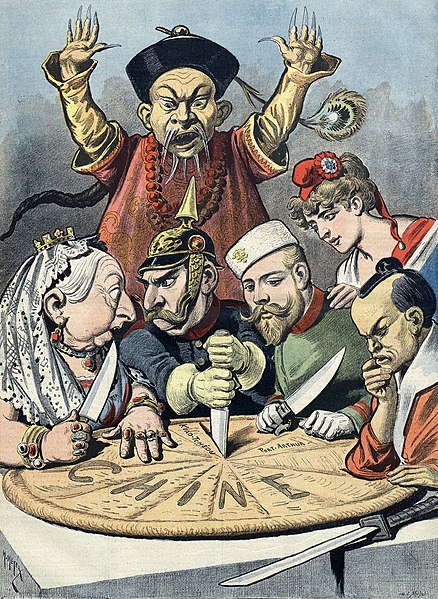The "century of humiliation" is a term used among the Sinosphere to describe the period in Chinese history beginning with the First Opium War (1839–1842), and ending in 1945 with China emerging out of the Second World War as one of the Big Four and established as a permanent member of the United Nations Security Council, or alternately, ending in 1949 with the founding of the People's Republic of China. The century-long period is typified by the decline, defeat and political fragmentation of the Qing dynasty and the subsequent Republic of China, which led to demoralizing foreign intervention, annexation and subjugation of China by Western powers, Russia, and Japan.

European powers plan to cut up China for themselves; Germany, Italy, the United Kingdom, Austria, Russia, and France are represented by Wilhelm II, Umberto I, John Bull, Franz Joseph I (in rear), Nicholas II, and Émile Loubet. The United States, represented by Uncle Sam, opposed this, seeking to keep China open for all. Puck Aug 23, 1899, by J. S. Pughe
A political cartoon depicting Victoria (the United Kingdom), Wilhelm II (Germany), Nicholas II (Russia), Marianne (France), and Meiji (Japan) dividing Qing China like carving up a pie.
Plaque in Chengde Mountain Resort marking the Convention of Peking as a "national humiliation" for China.
American troops storming the Peking city walls during the Boxer Rebellion, 1900
The First Opium War, also known as the Anglo-Chinese War, was a series of military engagements fought between the British Empire and the Qing dynasty of China between 1839 and 1842. The immediate issue was the Chinese enforcement of their ban on the opium trade by seizing private opium stocks from merchants at Guangzhou and threatening to impose the death penalty for future offenders. Despite the opium ban, the British government supported the merchants' demand for compensation for seized goods, and insisted on the principles of free trade and equal diplomatic recognition with China. Opium was Britain's single most profitable commodity trade of the 19th century. After months of tensions between the two states, the Royal Navy launched an expedition in June 1840, which ultimately defeated the Chinese using technologically superior ships and weapons by August 1842. The British then imposed the Treaty of Nanking, which forced China to increase foreign trade, give compensation, and cede Hong Kong Island to the British. Consequently, the opium trade continued in China. Twentieth-century nationalists considered 1839 the start of a century of humiliation, and many historians consider it the beginning of modern Chinese history.

The East India Company steamship Nemesis (right background) destroying war junks during the Second Battle of Chuenpi, 7 January 1841
View of Canton with merchant ship of the Dutch East India Company, c. 1665
View of the European factories in Canton
Chinese opium smokers








